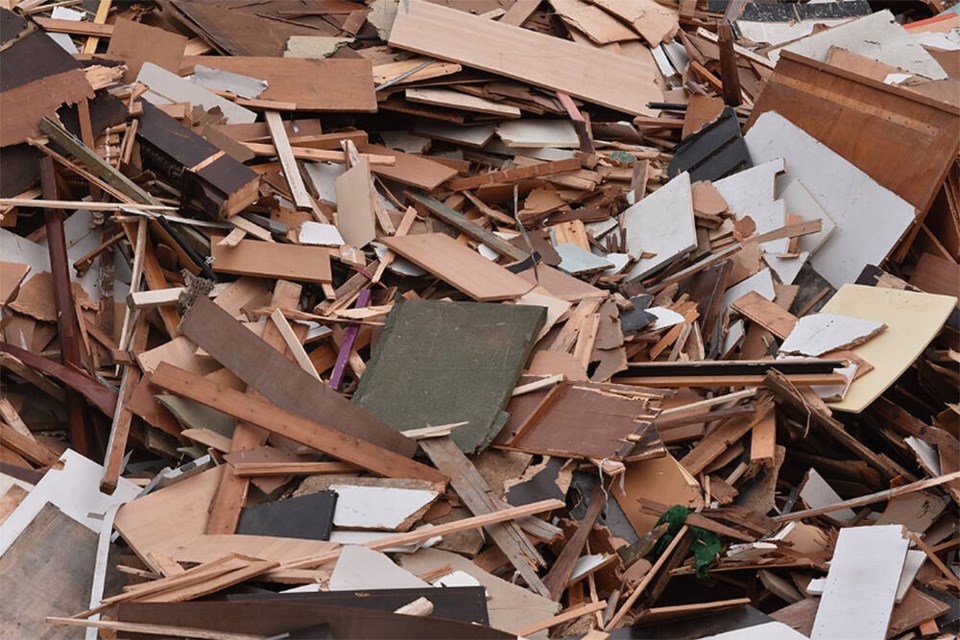Less scrap wood is ending up at the Vancouver Landfill in Delta.
That’s according to a recent report to Metro Vancouver’s Zero Waste Committee on construction material diversion rates, which notes additional diversion opportunities continue to emerge for wood products, including from houses set to be demolished. Homes set for the wrecking ball can also be moved and reused.
In 2021, 1,805,905 tonnes of construction and demolition waste was generated in the Metro Vancouver region, of which 79 per cent of was recycled, compared to an overall regional diversion rate of 65 per cent.
The 2022 study found that disposed wood decreased from 2018 to 2022, representing 50 per cent of the construction and demolition waste stream. The study analyzed the composition of construction and demolition material disposed at the Vancouver Landfill and the Ecowaste Landfill, a private landfill in Richmond.
By weight, the recycled construction and demolition material was mostly concrete, asphalt and wood. Other materials such as gypsum, fibre such as cardboard, as well as metals, are also commonly recycled by the construction and demolition sector.
The recycling rate for gypsum was not calculated in the study as the disposed quantities are challenging to estimate, given that gypsum is frequently disposed of with other potentially asbestos containing materials, the report notes, adding that, nonetheless, the actual recycling rate for gypsum is estimated to be greater than 90 per cent.
Salvageable wood fixtures were added to the latest waste composition data, which found that wood represented 48 per cent of the construction and demolition waste stream, a slight decrease from the previous year. The majority of wood, at about 75 per cent of the total material, was painted, treated or engineered wood products.
Clean wood is banned from disposal in Metro Vancouver because it has reliable landscaping, farming and engineered derived fuel markets, the report notes.
However, painted, treated and glued wood products are challenging to recycle due to the chemicals and glues used in manufacturing; therefore, a large portion of engineered wood products are disposed of, according to the report.
Overall, disposed wood decreased from 2018 and 2022 by approximately 66,000 tonnes.
Meanwhile, in 2021, more than 3,800 residential units were demolished including apartments and single-family homes.
The report notes that in Metro Vancouver most buildings are still taken down by traditional demolition methods, making building materials unsuitable for reuse or recycling.
An estimated 20 per cent of demolished homes are high-quality homes that can be moved and repurposed, while another 60 per cent could be deconstructed and the materials salvaged for reuse.
The report also notes member jurisdictions and Metro Vancouver promote a range of initiatives to encourage reduction, reuse and recycling of construction and demolition materials, including a disposal ban program that helps keep readily recyclable materials and materials that pose operational risks and are hazardous out of the waste stream.
Metro also revised its Construction and Demolition Waste Reduction and Recycling Toolkit that aims to increase awareness of reuse and recycling options for building materials.
The Toolkit provides a centralized source of information for contractors, designers and homeowners. The Toolkit also provides an overview of alternatives to demolition, such as home relocation and repurposing, deconstruction and salvage of building materials.
The regional district is also collaborating with a house moving company to provide a temporary storage location at the Coquitlam Landfill for relocated houses that would otherwise be demolished.
The first house was successfully delivered on June 30, 2023. Currently, five houses are being stored at the former landfill, preventing an estimated 90 tonnes of waste and creating a lower cost housing option when they are moved to their final destination.



